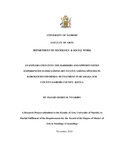| dc.description.abstract | he devastating impact of Acquired Immune Deficiency Syndrome (AIDS) in the world – especially in sub- Saharan Africa- has led to unprecedented global efforts to ensure access to antiretroviral (ARV) medicines that moderate the effects of the disease. In order to ensure further reduction in the prevalence of HIV as well as lower the resistance of the disease to ARV medicines, it is essential that an effective disclosure support process should be an integral part of any treatment programme. Failure to tackle this will jeopardise the future of treatment programs and may result to failure of the immense global and national efforts to provide hope for people living with HIV.
This study explored the barriers and opportunities experienced in disclosing HIV status among spouses in korogocho informal settlement in Ruaraka sub-county, Nairobi county. The study applied both probability and non-probability methods of sampling to get the calculated sample size of 24 respondents. Non-probability method of sampling was used to get Focus Group Discussions and key informants. Purposive sampling was used to identify the key informant and FGDs participants. The qualitative data was transcribed and presented in detailed descriptions of the interviews and focus group discussion findings.
The study findings indicate that experiences of HIV status disclosure vary among spouses. The key barriers to disclosure identified include Fear, gender inequalities, Stigma, discrimination, disempowerment and poverty. These barriers cripple an individual‘s coping mechanisms with the HIV infection and subsequently affect their ability to disclose.Respondents felt the need for unconditional acceptance and support from the entire community, health care providers for them to be able to curb the barriers to disclosure and explore more into the opportunities for disclosure. The study established that counselling is an important point of contact that can be used to address barriers to HIV status disclosure. However, it was revealed that there is need for improvements in the level of and type of counselling offered when providing test results.
The study recommends the mainstreaming of culturally appropriate counselling strategies in the on-going counselling practice, introduction of community based programs to reduce stigma associated with HIV and AIDS, strengthening of Post Test Clubs (PTC‘s) in order to provide a platform of sharing information and experiences and the promotion of couple counselling in order to minimize negative outcomes of disclosure. It is anticipated that besides adding to the empirical body of knowledge on the barriers and facilitators of HIV status disclosure, the results from this study shall equip policy makers with the data and evidence to inform decision making at county and national level. It shall also furnish scholars in the social arena with information on existing research gaps that require support for further investigation. | en_US |



